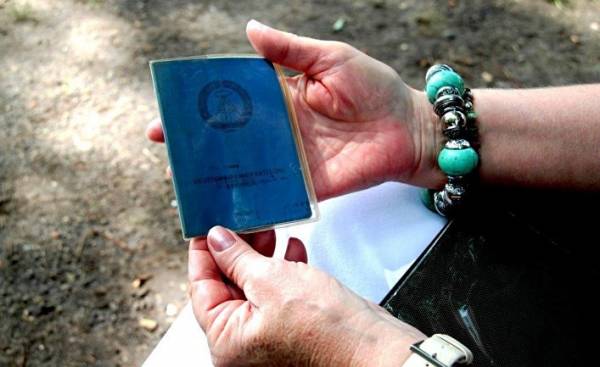
Every weekday morning at the Dresden home for the elderly white-haired women patiently lining up at the door, come inside and instantly back almost six decades ago in his past life in Communist East Germany.
The majority of these women (at least 80), a severe form of dementia, but a reminder of bygone days cause them to have flashbacks and regain skills that were once considered lost, bringing patients into a state of awesome happiness and peace.
They leave their walkers near pointer to the Kaufhalle Department store popular in the former GDR chain grocery stores wearing their motley nylon aprons and start your day in the same way as 50 years ago. They are finely cut peppers, tomatoes and sausage popular in the years of their youth Hungarian salad, wash dishes in this sink metal 1960-ies and Ironing the old-fashioned irons, while gleefully singing sounding from the player luscious sentimental tunes, popular in East Germany.
It is hard to imagine that many of them have recently been bedridden and couldn’t feed himself or use the bathroom, says günther Wolfram (Wolfram Günter), the Director of the nursing home Alexa in Dresden, a city located in the former East Germany.
“From the very first day this room is a great success, says Mr. Wolfram. — People are very happy, learning things from the past. Immediately they begin to feel comfortable.”
According to Gunther Wolfram, who himself grew up in East Germany, Communist kitsch, and other memorabilia bring pleasure to some of the 130 inhabitants of his nursing home, he discovered quite by accident. It happened two years ago when he decided to decorate the theater of the nursing home by putting it tacky old-fashioned kind of scooter “Troll” who once was very popular in East Germany.
“Instead of focus on the film, these people were impressed with the scooter. They would suddenly remember how to turn on the ignition and burning eyes was talking about how long ago went to their “Trolls” on the Baltic sea. It was amazing,” says Wolfram.
Inspired by this discovery, he decided to create an entire room in the style of the GDR 1960-ies.
He walked around the local flea markets and soon gathered an impressive collection of well-known goods “Aussie” slang word signify goods and people from East Germany.
He collected washing powder Spee and Fewa, yellowing magazines and a plastic pepper and salt shakers, which in East Germany were in almost every house. He also found a wooden wall in such a way that at the time could afford only wealthy people. Together with colleagues he set up a room 1960s years and the inhabitants of nursing homes are so eager to be in a place where they feel at home that started coming there in droves.
Due to the success with which this room list of the future inhabitants of the nursing home cannot accommodate everyone, and the Directors of the other nursing homes we call Tungsten, asking him for advice.
Soon the demand for daily travel to the past is so increased that the Tungsten arranged another room, this time in the style of East Germany 1970-ies, where, among other things, curtains from a fabric with a psychedelic pattern, standing floor lamps with fringe and bright orange rotary phone.
In West Germany and capitalism characteristic of the U.S. consumerism has triumphed just a few years after the Second world war. In Communist East Germany to materialism and the lust for consumption was frowned upon, and consumer goods were in short supply. As in East Germany in supermarkets Kaufhalle sold goods of several brands, among former East Germans, they are very recognition.
Some of these products take an important place in the German film “good bye, Lenin!” (“Good-bye Lenin!”), nominated in 2003 for the award “Golden globe”. The film’s protagonist — the son of the woman lapsed into a coma shortly before the fall of the Berlin wall in 1989. After she finally comes out of the coma in reunified Germany, he is desperate to recreate a home atmosphere of the former East Germany. Guy throws house a store of cans of pickles famous brand Spreewald and other products from East Germany, trying to destroy the house of all traces of capitalism.
According to the gerontologist of the clinic Charite Berlin University of Herlinda Maggese (Herlind Megges), which is not related to the project nursing homes Alexa, this therapy can help to restore abilities and improve the well-being of patients with dementia.
“The therapy memory is often used because it activates what has not yet disappeared and that still works well, says Merges. For those people who feel bad in this world, because it is not consistent with their memory status, it is important that there is an environment in which they feel comfortable.”
Megges, believes that the objects of the earlier stages of life of the patient that are associated with a sense of joy, pleasure, comfort, can help improve physical and cognitive abilities. Often, even if the loss of short term memory patients can still recall events from their childhood and adolescence.
Millions of elderly people worldwide suffer from Alzheimer’s disease and other forms of dementia, in which they lose the ability to respond to their environment. And although the methods of treatment has not yet been found, research institutes around the world trying to find more effective ways of dealing with this disease, ways of preventing or slowing down its beginning and improve the quality of life of patients with dementia.
“We treat symptoms we are currently not able to deal with the causes of this disease,” says Merges.
For 92-year-old pensioner Gerda Noack (Noack Gerda), who was born and grew up in Dresden and was a master at making hats, “the last room” — a gift of fate.
An elegant woman who always wears around his neck carefully knotted silk scarf, usually spent the whole day wandering the corridors of the nursing home, says günther Wolfram. Before Gerda began to visit the “room of the GDR 1960-ies,” she was kind of restless, depressed and constantly looking for something that she thought she lost.
Last week, standing in the “kitchen of the past”, she was calmly stirring in the old pan chopped pepper, and then with a satisfied expression on his face cleaned the dishes. To the question if she was happy, although happily nodded, waiting for the nurses will serve Hungarian salad, which she helped to prepare.
“Thanks to these ordinary, familiar lessons in the company of other women and in familiar surroundings the inhabitants of our house really feel much more relaxed, says Wolfram. For them it has become almost a place of work where they spend the entire week feeling like a need and finding a whole new meaning of life.”







